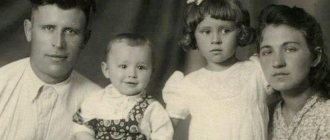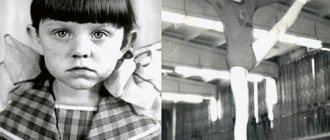After the formation of the USSR, the need arose to form not only a new social and legal order, but also cinema. Adapting to these requirements, most films in subsequent years told about the life of peasants and workers. Therefore, there was a need for a new type of actresses who outwardly resembled simple rural women, but at the same time possessed a subtle mental organization. Soviet actress Valentina Telegina got into films precisely because she belonged to this type, and throughout her career she was incredibly in demand. However, was her personal life as successful as her professional one?
The origin of the actress and childhood
Valentina Petrovna Telegina was a real hereditary Cossack woman. She was born in February 1915 in Novocherkassk, which at that time played the role of the capital of the Don Cossacks (today the Rostov region). Despite the difficult period in which the future actress spent her childhood, she grew up as a mischievous and sincere girl. While studying at school, Telegina joined a local theater group, from which her passion for acting began. The head of the circle, who was a former artist, highly appreciated the talent of young Valentina and advised her to enter a theater university after graduating from school.
Personal life of celebrities.
Valentina Telegina’s personal life was closely connected with theater and cinema. Arriving in Leningrad from her native Novocherkassk, she immediately entered the second year of the Institute of Performing Arts and at the same time attended courses at Lenfilm, organized by Sergei Gerasimov. The first film in her creative biography was “Do I Love You,” in which the nineteen-year-old aspiring actress played a very small role.
In 1937, after graduating from university, Valentina Telegina came to the Theater. Lensovet, then she was twenty-two years old, and from that time her successful career began. In the same year, Telegina was invited to star in the film “Komsomolsk” by Sergei Gerasimov.
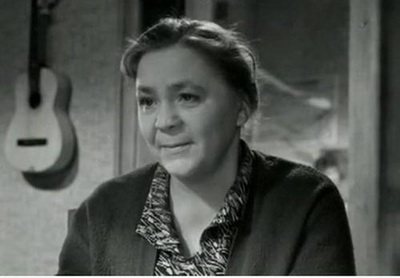
In the photo - Valentina Telegina
Almost just before the war, the actress moved to the Baltic Fleet Theater, and when the start of war was announced, she and other theater actors went to the front. After the war, Valentina Telegina’s personal life took place in Moscow, where she became an actress at the Film Actor’s Studio Theater. She was invited to act a lot, but mostly these were supporting roles. Most often, Valentina Petrovna was trusted to play nurses, poultry workers, cooks, milkmaids, i.e., according to the actress herself, she always played a simple Russian woman.
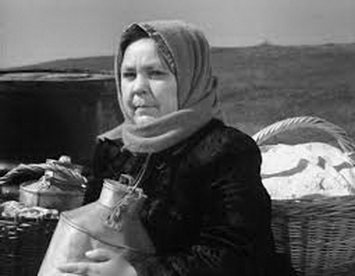
She was very popular and loved by the audience, who appreciated Telegina for her sincere acting, her charm and warmth. She could not become a screen star in the usual sense of the word, because she did not have a stellar appearance, but thanks to her simplicity, the actress immediately became “one of the people” among millions of Soviet viewers. Valentina Telegina did not like when she had to play negative heroines, but she also succeeded in these roles brilliantly - remember only Alevtina the moonshiner from Rostotsky’s film “It Was About Penkov.”
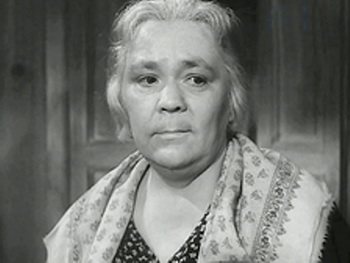
Among other negative roles uniquely played by the actress are the priest in “Oleko Dundich”, the moonshiner in “Pavel Korchagin”, the evil sorceress in “The Tale of Lost Time”. Over time, the actress began to play age-related roles, which she succeeded no less organically - a cook in the film “Turn on the Northern Lights”, a grandmother in “A Drop in the Ocean”, Marya Ivanovna in “Telegram”. Valentina Petrovna was ready to play until her last breath, and at the end of her life, when she was already sick a lot, she rarely acted anyway. Until old age, she retained her optimism and cheerful character, with which Valentina Telegina attracted universal love.
This celebrity is often searched for:
- Valentina Titova: personal life Both of her husbands were real geniuses...
- Valentina Telichkina: personal life Doesn’t consider herself a star...
- Valentina Mazunina: personal life Dreams of a happy future...
Categories Blog Tags:
Students
Full of the wildest hopes, Valentina Telegina came to Leningrad and successfully passed the exams at the Institute of Performing Arts. Moreover, her performance made such a strong impression on the admissions committee that the young Cossack girl was immediately enrolled in the second year.
Initially, Telegina was assigned to the workshop of teachers Vivien and Sokolov, but later she, of her own free will, moved to the then legendary Soviet director Sergei Gerasimov. And not in vain, because he was not only an amazing teacher, but also had a habit of featuring students who were especially dear to him in his films. Having appreciated the talent, and most importantly, the surprisingly relevant type of true Russian woman Telegina at that time, Sergei Apollinarievich began to often invite her to appear in his works.
From the village to the capital
In the first half of the 20th century, cinema was the most important art for Soviet people.
There is no exaggeration in this thesis. After the revolution and the Civil War, the country began to build a new society. The biography of People's Artist of Russia Valentina Telegina, even in small details, coincides with the history of the Soviet state. According to the data indicated in the metric, the girl was born on February 23, 1915 in a Cossack family. The Telegins at that time lived in the city of Novocherkassk. The child, as was customary, was raised in simplicity and severity. For many centuries, few people were interested in how a simple woman from the draft class lived. It was about noblewomen that novels were written, plays were staged and films were made. And only with the advent of Soviet power did they begin to show attention and care to working women. If we talk about Telegina, then the Cossack woman had a real prospect of getting a decent education and a decent job. When she went to school, there was already a different order and a different atmosphere compared to the old regime. The lively girl was immediately attracted to participate in amateur performances.
Here she got her first glimpse of working on stage. Of course, the ossified morals of her relatives and neighbors opposed the girl’s frivolous hobby. But Valentina, despite the gloomy protest, got ready and went to Leningrad. Without any special obstacles, I entered the Institute of Performing Arts. The beginning of a professional acting career was filming in Sergei Gerasimov’s film “Do I Love You?” In 1937, Telegina, who received her diploma, was invited to the troupe of the Theater. Lensovet.
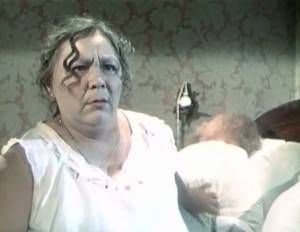
First work in cinema and the war years
Valentina Telegina made her screen debut in 1934 in an episode of one of her teacher’s films – “Do I Love You?” After that, she did not act for almost 3 years, concentrating on her studies, and after graduating from college, she began playing on the stage of the Lensovet Theater.
In 1937, she was invited to play in one of the episodes of “The Golden Taiga,” and a year later Gerasimov gave her the role of Motya Kotenkova in “Komsomolsk.” It was this role that later determined the entire creative path of the actress and her role - a simple woman/grandmother from the people, who is so natural that she seems to live in the neighboring yard.
A year later, Sergei Apollinarievich again invited his student to play Stepanida Lagutina in “Teacher”. Her heroine had almost no text, but she was present in many scenes, symbolizing the difficult lot of uneducated and oppressed peasant women.
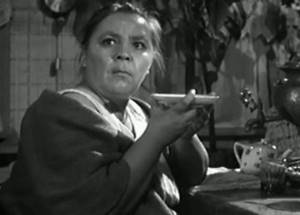
Despite all these successes, Valentina Telegina gained real fame by playing her namesake in the film “Member of the Government.” Now many directors invited her to act in films, but the Great Patriotic War broke out, and the actress, suspending her activities, voluntarily went to Tallinn, where fierce battles were taking place, as part of the acting crew. Later their troupe ended up on the island of Ezele.
Here, in her free time from performing, Valentina Telegina was a cook, a nurse, and a laundress. She took on any job to help brave warriors. After many years, V. Rudny will write a novel about her selfless activities.
Later, the actress returned to Leningrad and lived there for some time, enduring all the hardships of the blockade, until she was evacuated to Alma-Ata.
During the war years, the actress starred in two films - “The Invincible” and “Secretary of the District Committee”, although she was not listed in the credits. Later she toured a lot at the front, and after the victory she moved to Moscow, where she was accepted into the studio named after. Gorky, and also played in the Theater-Studio of the Film Actor.
Carier start
After graduating from the institute in 1937, Telegina was invited to the Leningrad Studio Theater, where she served until 1940, and then moved to the Baltic Fleet Theater, where she learned a lot from its director, Alexander Pergament, respect and warm feelings for whom she retained until the end of your days.
Valentina didn’t give up cinema either. In 1937, she starred in an episode of the film “Golden Taiga”, after which Sergei Gerasimov invited the girl to two of his films: “Komsomolsk” (1938) and “Teacher” (1939). Also in 1939, Telegina starred in the films “Member of the Government” and “Surgery.”
Valentina Telegina’s first roles set the tone for her entire career - these are good, kind women who do not strive to come to the fore, but with their sincerity, openness and sincerity are imprinted in the viewer’s soul immediately and forever. The ability to simply and clearly express the feelings of her heroine, to show a vivid and instant reaction of the soul forever determined the range of her roles - a simple Russian woman, a Russian mother.
Subsequently, she will not be offered complex roles of women “noble, with a complex mental organization”; these will be more episodic roles: peasant woman, conductor, nurse, driver. However, it was they who, with their sincerity and liveliness, rightfully won the main place in the memory of numerous fans of her talent, the skill of the “queen of episodes”.
Further career
After the war, a real stellar period began in Telegina’s career - she was bombarded with offers to act, and although most of her roles were minor, they sometimes became the main highlight of films.
Among her creative heritage are many heroines - a nurse, a female driver, a peasant woman, a moonshiner, a conductor, an evil sorceress, and even a brothel owner. Each of these roles was played so perfectly that the actress was given the nickname “national aunt.”
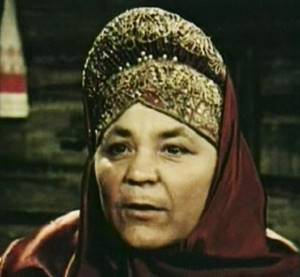
The most beloved films by viewers with the participation of the actress are “Kuban Cossacks”, “The House Where I Live”, “It Was in Penkovo”, “Ballad of a Soldier”, “Three Poplars on Plyushchikha”, “We’ll Live Until Monday” and many others . In total, Valentina Telegina’s creative repertoire includes more than sixty roles, as well as several voiced cartoons.
Theater and Cinema
While still a student, Telegina had the opportunity to play in a short episode in Gerasimov’s film “Do I Love You.” After graduating from university, she worked at the Leningrad Studio Theater, and before the war at the Baltic Fleet Theater.
Her mentor S. Gerasimov invited her to play in several of his films - “Komsomolsk” and “Teacher”. The young actress managed to play before the war in “Surgery” and “Member of the Government,” where she played her namesake Praskovya Telegina. Almost all of Telegina’s heroines are simple, hard-working Russian women with a strong character, whom it was easier for the actress to play, since these heroines were closest to her.
During the war, Valentina ended up on the Baltic island of Heysel, from where she was able to evacuate to Tikhvin with great difficulty. As a result, together with the actors they went to Alma-Ata.
Finding herself in the capital after the victory, the actress joined the staff of Mosfilm and the Film Actor's Theater. She managed to star in the films “The Train Goes East”, “Spring”, and in “Kuban Cossacks” she played the bird-keeper Avdotya Khristoforovna.
In the 50s, Telegina was invited to many films - “In the Steppe”, “The Fate of the Drummer”, “Pavel Korchagin”. Having played Valentina Vlasyevna in “It Was About Penkov” and Klavdia Davydova in “The House I Live in,” the actress became truly famous throughout the country.
But directors often offered the talented actress to play not only strong-willed and kind Russian women, but also negative characters. In “Oleko Dundich” she played a priest, and in “The Wind” she even played a brothel owner. The actress got small but striking roles in “Farewell, Doves” and “The Ballad of a Soldier.”
In “The Tale of Lost Time,” the actress played an evil sorceress, and she did not like her own performance. In recent years, Valentina Petrovna has almost always been offered roles in star films included in Soviet film classics - “We’ll Live Until Monday,” “Three Poplars on Plyushchikha,” “Gloomy River,” “Remember Your Name.”
Often the actress, with her soulful voice, had the opportunity to voice cartoon characters and duplicate foreign artists.
The story of the actress's missing brother
Off the set, Valentina Telegina was very different from her heroines. Those who were closely acquainted with her noted that by nature the actress was a real city dweller and a very intelligent woman. On the one hand, she was open and sympathetic, but at the same time she knew how to keep her distance and rarely shared her heartfelt secrets with Valentina Telegina. Her family was shrouded in a lot of secrets, most of which she took with her.
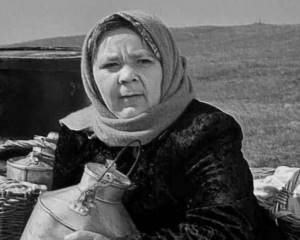
For example, almost no one knew that she had a younger brother, who during the Great Patriotic War was forcibly deported to Germany as a labor force. However, instead of hard labor, he was sent to intelligence school, and after the war, he was transported to West Germany, where, under the name Kondrashov, he lived until 1957, when he was able to get to his homeland.
If in those years it had become known that a prominent Soviet actress had a brother who lived in the occupied territory and was also involved in espionage, Telegina could have lost her career, so this story became public knowledge only at the end of Valentina Petrovna’s life.
Movies
After the end of the war, Valentina moved to the capital, she was enrolled in the staff of the Gorky Film Studio and the Film Actor Studio Theatre. Valentina Petrovna began to be invited to many films: in 1947 she played in the films “Spring” and “The Train Goes East”, the following year the actress starred in the film “Precious Grains”, and in 1948 she received a role in “Kuban Cossacks”.
They were followed by works in the films “In the Steppe” (1950), “The Country Doctor” and “Sporting Honor” (1951), “Hypnosis Session” and “Steppe Dawns” (1953), in 1954 the films “Icy Sea” and “World Champion”, then there were roles in the films “Earth and People”, “Lyana”, “Sailor Chizhik” and “The Fate of the Drummer”.
The year 1956 was also fruitful - several films with the participation of Valentina Telegina were released: “Main Avenue”, “The Girl from the Lighthouse”, “Pavel Korchagin”, “The Poet”, “Journey to Youth”.
In 1957, Valentina Petrovna received roles that became one of the central ones in her filmography: the role of Alevtina Vlasyevna in “It Was About Penkov” and the main role of Klavdia Kondratyevna Davydova, the mother of three children, in the film “The House Where I Live.”
Swedish film critic Rune Muberg highly praised Valentina Petrovna’s work in the film “The House I Live In,” calling Telegina’s face the face of the era, the face of a great people, the face of all mothers of war. The sincerity of her heroine so shocked the critic that he wished that Valentina Telegina’s face “would forever remain in everyone’s memory.”
In 1958, several films were released, in two of which Valentina Petrovna played negative characters - in the film “Oleko Dundich” she played the role of a priest, and in the film “The Wind” she played the role of a brothel owner. Telegina did not like these roles, they did not suit her soul, but she still played with her usual dedication and sincerity.
The truthfulness of even her negative characters was so accurate that at meetings with the audience they were surprised how she knew the inhabitants of their village, for example, the moonshiner, so similar to her heroine from “Pavel Korchagin”.
The following year, actress Telegina received a small cameo role in the military drama “The Ballad of a Soldier,” a film that became the absolute champion among award-winning domestic films. It seems that this is largely due to the image of the female driver played by Valentina Petrovna.
The original version of her role involved a short monologue, but the actress refused it, deciding to say only one phrase. She showed the grief and anxiety of women about their sons and husbands who went to the front only with facial expressions and eyes, and they were able to express more than words.
In the same year, 1959, the films “In Our City”, “The Extraordinary Journey of Mishka Strekachev”, “Quarrel in Lukashi” were released. The following year, Valentina Petrovna received one of the main roles in the film “Farewell, Doves.”
After this, actress Telegina played the main role in two more films: “The Tale of Lost Time” (1964) and “A Drop in the Sea” (1973). Moreover, Telegina will remain forever dissatisfied with the role of Avdotya Petrovna, the evil sorceress from “The Tale of Lost Time” - the image turned out to be cardboard, insincere, without character, the actress did not like to work like that.
Over the next few years, Valentina Petrovna will play in dozens of films, some of which will become classics of Soviet cinema: “The Living and the Dead” (1963), “Three Poplars on Plyushchikha” (1967), “We’ll Live Till Monday” (1968), “Gloomy” river" (1968), "Remember your name" (1974).
We also heard the kind, caring voice of the actress in the cartoons “Grey Neck”, “Orange Neck” and “The Last Bride of the Snake Gorynych”, as well as in the films “Quiet Odessa” and “Ilse”, where she dubbed actresses.
Valentina Telegina: husband
There was another mystery that shrouded the life of the famous actress. Even the people closest to her did not know about her. It was about the men whom Valentina Telegina loved.
Her personal life, meanwhile, was quite stormy. Despite her appearance as a rural woman, the actress was a very well-groomed and charming woman who was liked by men. According to Valentina Petrovna herself, she had a pilot husband, who became the father of her daughter Nadezhda. However, how true this story is is unknown, because the excuse “husband is a pilot” or “sea captain” is traditional for single mothers.
Telegina’s daughter said that throughout her life she had reverent feelings for theater director Alexander Pergament.
Valentina Telegina began working with him in the early forties, with the arrival of the Baltic Fleet Theater. Together they toured a lot at the front, so it is quite possible that the actress developed romantic feelings for the director. Were they mutual? Now no one can answer, especially since the director had a wife - actress Evgenia Tserebilko. Pergamentov died almost ten years before Telegina, and even in her last days she remembered him.
Valentina Telegina: Wikipedia tells
The problem with finding information about the darling of millions is that Telegina did not like to talk about herself on the record. Fragments of colleagues’ statements have survived to this day. Valentina Petrovna was a person of exceptional modesty. Having started acting in films, she even allowed me not to include my own name in the credits, because the director had to spend extra money on preparing a list of names of extras and supporting actors.
Wikipedia gives dry information. People's Artist, meager biographical summary. Below in the text you will find out the archival materials found. The article was put together bit by bit.
“I always play my favorite role of a simple Russian woman,” said Telegina. The words convey her philosophy of life. The girl was born in the city of Novocherkassk. Urban, she constantly played rural women, as if she had been in such a society from birth. Nature gave Valentina Petrovna a traditionally common appearance. In her youth, Telegina easily played the role of older women. Keep in mind: there was no makeup back then! Valentina knew how to masterfully make a face that no one could tell: in front of him was a young girl, and not an elderly grandmother.
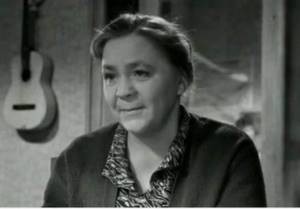
“I got to know everyday life,” say contemporaries and colleagues with whom Valentina Telegina crossed paths at the venues. She knew how to adapt to the artist during takes and helped young girls. She knew how to cry in front of the operator in a way that no one else could. With experience, Telegina developed a recognizable folk, womanish dialect. No one can learn to play such a speech.
Some directors noted that the talent for improvisation that Valentina Petrovna possessed drew out the plot. Later the painting was admired throughout the country and abroad. Telegina felt where she needed to put a cross on herself, where to squeal, where to raise her tone. The actress was adored by filmmakers for her courage and inner freedom.
Official sources claim that Valentina Telegina acted in 83 films over 64 years of life and creativity. The list is far from the truth, because as stated above, Valentina allowed her not to be included in the official credits of the actors involved in the filming.
The last years of Valentina Telegina
In the last years of her life, the actress was sick a lot, but continued to act and give interviews.
The “national aunt” died in October 1979 and was buried at the Moscow Mitinskoye cemetery. A few years after her death, her daughter Nadya sold her Moscow apartment in the center and moved to live in the Moscow region.
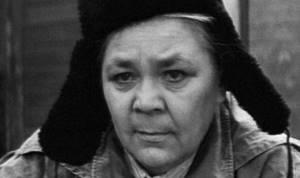
According to reviews from friends and colleagues, Valentin Telegin was of amazingly persistent and noble character. Personal life, family and an incredibly successful film career - although she had all this, it was not always the way she would like. Fortunately, no matter what difficulties she faced in her life, Valentina Petrovna always managed to emerge from any situation as a winner.
Valentina Telegina: personal life, family, husband, children
Valentina Telegina was distinguished by her straightforward disposition. She knew how to tell the truth to her face and did not hide her personal opinion. Not everyone liked this free attitude. The artist had few true friends.
The heroine's personal life is shrouded in mystery. The problem was the reluctance to give interviews and talk about emotional topics.
It is known that Telegina was married once. There was no recorded official confirmation of this fact. In the depths of the network, we managed to find the only interview with Nadezhda’s daughter. The populist’s daughter performed in the “To Be Remembered” program after the death of her mother. Nadezhda Telegina claims that there was a father, but he left his wife and newborn immediately after the girl was born.
Valentina herself claimed that her husband was a pilot. What flies on special classified missions, where he cannot be seen by the scumbags. Obviously, the heroine had a hard time leaving the man’s family. The relationship with his daughter was not going well. Valentina Telegina filmed picture after picture, but was not physically at home. I bought an apartment in the center of Moscow, where Nadya was left to her own devices. The girl often invited friends and had parties. In adolescence, the first problems with alcohol appeared. Valentina Petrovna tried to be a good mother, forgave, and tolerated bad behavior. By turning a blind eye to Nadya’s actions, she was ruining her only daughter. The girl and her mother grew very distant from each other. Her mother's fame became a heavy burden for Nadya.
At the end of her life, having received a bouquet of illnesses in gratitude from the acting profession, Telegina had a long correspondence with director Alexander Pergamentov. When the actress and the master met, the man was married. This relationship did not go beyond correspondence. But critics believe that it was Alexandra Telegina who called “the last love”, which fate did not allow to play.
